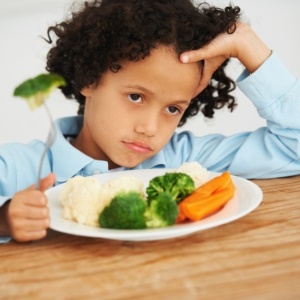
I regularly receive questions from worried parents about their children's “picky eating”, “food refusal” or “food/meal tantrums”.
The general consensus is that it is normal for children to go through phases when they only want to eat some foods, or refuse to eat certain foods, often using food as a means of drawing attention to underlying psychological problems, or exerting control over parents and siblings.
Read: Experts debate what's 'normal'
However, the results of a new study conducted at the Department of Psychiatry and Behavioural Sciences, Duke University School of Medicine, North Carolina, suggest that “selective eating (SE)”, the term used to describe “extremely picky eating” in young children between the ages of 2 and 5 years, may well be an indication of deeper trouble, such as anxiety disorders and depression.
Although I have always felt that it is important for doctors and dieticians to keep psychological factors in mind when consulted by parents who are worried about picky eating in their children, this study indicates that we may need to pay greater attention to possible underlying psychological problems in some of these children.
The 'Selective Eating Study'
Dr Nancy Zucker and her team screened 3,433 children between the ages of 2 and 6 years at risk of anxiety who were being treated at the Duke Children’s Primary Care clinics. Eventually the researchers enrolled 180 children suffering from anxiety for follow-up, as well as control children who did not exhibit SE.
Read: Anxiety disorders
Parents were asked to complete an assessment of their child’s
psychopathology and levels of Selective Eating. If the child was so selective
in their eating habits that this prevented them having meals with other people, they were classified as “SE 2" or severe level SE.
The researchers found that children classified as moderate or severe SE subjects were more inclined to have increased symptoms of anxiety or depression, suffer from hypersensitivity to the taste and texture of food. They were found to have mothers who also suffered from increased anxiety, with conflicts centring on food.
Dr Zucker and her co-workers recommended that because the severity of the psychological symptoms increased as the severity of SE increased in these children, healthcare providers should "intervene at even moderate levels of SE". They also suggest that once SE is linked to problematic psychosocial functioning (anxiety, depression, ADHD etc.) in young children, coupled to a breakdown in family functioning, the young patient should be diagnosed as suffering from “avoidant/restrictive food intake disorder" (ARFID), an eating disorder that encapsulates maladaptive food restriction” (a new category in psychological classification).
In view of the fact that 14 to 20% of parents report that their toddlers and preschool children are picky eaters and that many parents are frustrated by their perception that healthcare practitioners do not take them seriously or provide relevant assistance, the new classification of severe SE as an actual psychological disorder may be helpful in future to improve identification and treatment of these young patients.
Children with severe levels of SE may continue to exhibit selective and restrictive eating patterns in their teenage years and some may go on to develop eating disorders in adulthood. Early diagnosis and treatment may, therefore, help to prevent such long-term problems.
Factors affecting food intake
To grow and be healthy, toddlers and preschool children need to eat a healthy, varied diet. The findings of the present study indicated that selective or restrictive eating in young children led to food aversions, reduced growth, and increased sensitivity to the textures, smell and appearance of foods. Children with severe SE also frequently had physical problems with swallowing.
Read: Is it possible to reverse an aversion to milk and dairy?
A child that refuses to eat, or eats only selected foods, or eats minimal quantities of food, will probably struggle to grown normally. Depending on which types of food a child avoids, their mental growth may also be impaired.
What parents can do
In view of the above, it is always important to monitor a child’s food intake, both in quality and quantity. If you as a parent are worried that your child is eating too little or only eating a limited variety of foods, then please engage expert help to have the child assessed.
Get a dietician to evaluate your child’s eating behaviour and food and nutrient intake. Also consult a medical doctor to rule out underlying physical problems such as difficulties with swallowing or sensory fall-out (a child who cannot smell food for example, may not be interested in eating). Discuss the possibility of severe selective eating (SE) or even avoidant/restrictive food intake disorder (ARFID) with your doctor or dietician and, if necessary, ask them to refer you to a child psychologist who specialises in childhood eating problems.
With the correct treatment and support, young problem eaters may be helped to overcome their eating aversions and selective eating behaviour – helping to create a harmonious home environment.
Read more:
Daily temper tantrums not the norm for preschoolers
References:
- Henderson, D (2015). Overly pick eating could be a sign of deeper trouble in kids. Medscape, Aug 03, 2015.
- Zucker N et al (2015). Psychological and psychosocial impairment in
preschoolers with selective eating. Pediatrics, 126(3)e 582-590.




 Publications
Publications
 Partners
Partners










